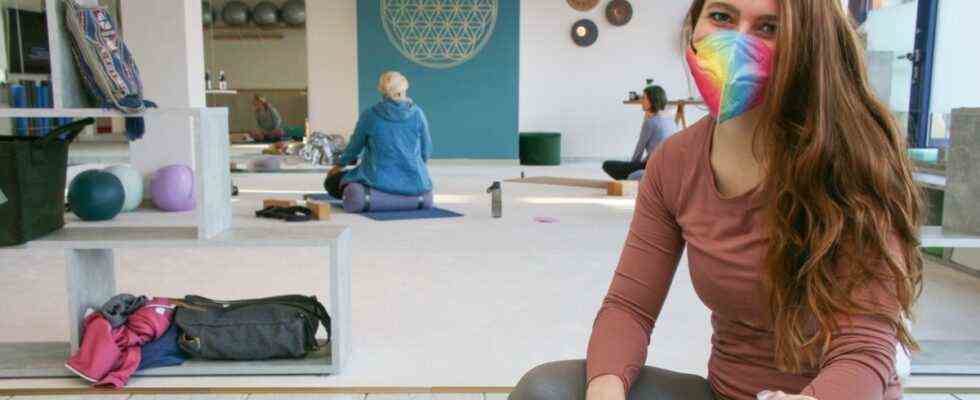When Renate Jaczek recently wanted to see a play in the Ludwig-Thoma-Haus, she actually felt quite well armed. The social worker has been vaccinated, has recovered and she had also brought her own rapid test with which she wanted to test herself for the coronavirus under medical supervision in front of the theater box office in order to comply with the 2-G-Plus rule. At work, Jaczek regularly tests herself, so she routinely wiped her nasopharynx with a cotton swab.
But then suddenly a pale second line appeared on the test cassette. “Great,” thought Jaczek resignedly and asked himself: is the test positive or false-positive? Some of the other people waiting immediately dodged Jaczek in a star shape, she says. A second test by the doctor present turned out negative immediately, but the doctor sent her to the PCR test center in Indersdorf. From a distance she called to a friend in the queue of the theater: “I can’t go in, my test is positive.”
At home, Jaczek did two more rapid tests – all negative. Her PCR test result, which she finally received after two days, was also negative. So she has to assume that her test in front of the theater was just false positive. She had already had such experiences with five other tests from this pack at her job. “The world hasn’t ended for me now, but of course I was annoyed that I couldn’t go to the theater that evening,” says Jaczek. More and more organizers and entrepreneurs are now realizing that self-testing on site brings with it some pitfalls.
One of those who offer self-tests on site is the Dachau yoga and Pilates teacher Stefanie Trapp. She invested around 500 euros in order to enable those customers who could no longer obtain a test to have a test. When your course participants come to the studio, they have to test themselves in the anteroom under Trapp’s supervision. Customers wait for their results with distance and mask. Only then are they allowed to go further into the mat room. “Fortunately, there has not yet been a single positive test,” says Trapp. She is happy that she can keep her studio open in this way, even if the procedure means an enormous amount of time for her. “For me, there are no breaks between courses because I have to supervise the tests and document everything,” says Trapp. She also personally helped an elderly student to apply the liquid onto the test cassette. “If someone comes to the course just before a little while, then it will be difficult for me to relax on the mat.” Ultimately, however, she would prefer all of this to another lockdown.
In the near future, at least after the third vaccination, things could be more relaxed. It is currently being debated whether the compulsory test could be suspended again for people who have already received a booster vaccination. This is already the case in Lower Saxony and Baden-Württemberg, for example. Until then, however, citizens in Bavaria will still have to rely on test options. And since the waiting times at official test centers are long and appointments rare, many resort to self-tests.
However, it is difficult to keep track of who is offering the self-test under supervision in the district. “We have no information about that,” says Sina Török, spokeswoman for the Dachau district office. There is no documentation of the self-test providers; Nor is it specified what proportion these make up for the 2-G plus rule in addition to the PCR and rapid tests. The reason: organizers and companies can decide for themselves whether self-tests are offered on site as an alternative to quick and PCR tests, without any action on the part of the district. “That depends solely on whether an organizer can manage to document the self-tests,” says Török. There are no further requirements.
In this way, the staff can supervise the mouth or nose swab even without specialist medical knowledge; the tests can be brought by the visitors or provided by the operator. However, the test result is earmarked. If, for example, the yoga class is followed by a visit to the cinema, the negative result is no longer valid for the latter.
Jürgen Neumair’s employees, on the other hand, can use their test at work for other occasions. The managing director of the elevator manufacturer Butz & Neumair in Bergkirchen has recently started offering a rapid test station on his company premises. In cooperation with an Erdinger rapid test operator, medically trained staff carry out antigen tests there, which are then valid for 24 hours. In addition to the 160 employees, citizens can also get a quick test on site.
When the test became compulsory for unvaccinated employees, Neumair simply no longer wanted to expose his employees to the difficult test situation. It is not only “catastrophic” to find a test date. “When you get there, people put their feet in their stomachs,” says Neumair. What makes the elevator manufacturer even more difficult is the fact that his employees are installing elevators in hospitals that require a negative rapid test even for those who have been vaccinated and those who have recovered. So he contacted the Erdinger rapid test operator. It took seven days for the test station to be set up at the Bergkirchen company. It has been in operation for a week and is slowly but surely starting up. “The organizational effort was huge.” After all, the test station needed electricity, internet and sufficient parking space. “But if you grit your teeth and pull through,” says Neumair, “then it works.” In any case, he would always put up with the effort.

